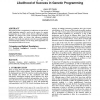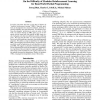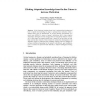52 search results - page 2 / 11 » The Difficulty of Programming Contests Increases |
GECCO
2005
Springer
13 years 10 months ago
2005
Springer
This paper presents a comprehensive, multivariate account of how initial population material is used over the course of a genetic programming run as while various factors influenc...
AAAI
2006
13 years 6 months ago
2006
In recent years there has been a great deal of interest in "modular reinforcement learning" (MRL). Typically, problems are decomposed into concurrent subgoals, allowing ...
SOQUA
2007
13 years 6 months ago
2007
With the proliferation of the new multi-core personal computers, and the explosion of the usage of highly concurrent machine configuration, concurrent code moves from being writt...
UM
2007
Springer
13 years 11 months ago
2007
Springer
In the classroom, teachers know how to motivate their students and how to exploit this knowledge to adapt or optimize their instruction when a student shows signs of demotivation. ...
GECCO
2006
Springer
13 years 9 months ago
2006
Springer
The population size in evolutionary computation is a significant parameter affecting computational effort and the ability to successfully evolve solutions. We find that population...



